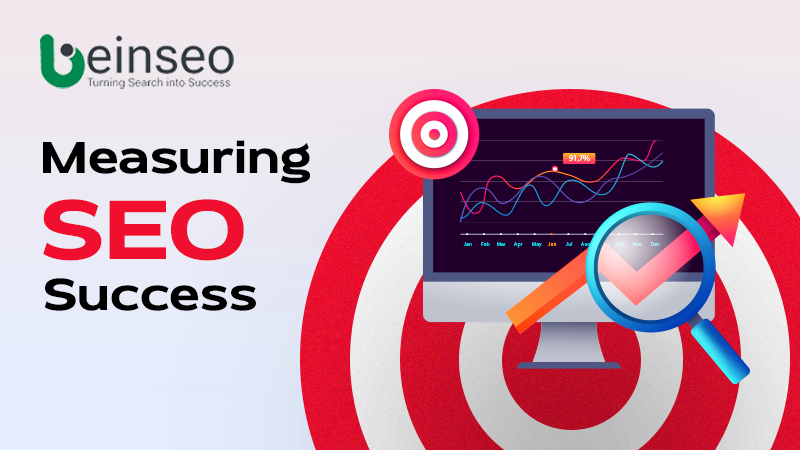#1 SEO Company Dubai
#1 SEO Company Dubai
Sun-Thu: 10 AM to 7 PM - Sat-Fri: Closed

In the ever-evolving digital landscape, where algorithms dictate the rules and visibility is your ticket to success, it becomes imperative to track your SEO efforts. Don’t you think you need to see if you have achieved the outcome you actually boast of?
You need to ensure that your digital efforts align with tangible results by carefully tracking and analyzing your SEO strategies.
This blog is your straightforward guide to how your online presence can soar. We're diving into the minute details of what makes a website stand out. From clicks to strategies, we're decoding the various metrics that matter.
So, for this we have come up with 13 most important key performance indicators and metrics to measure SEO success.
Let’s say you have an SEO company managing the online presence of a construction company. And you need to measure the SEO success. You can use organic traffic metrics to understand how your website performs in search engine rankings and its ability to attract users naturally.
Google Analytics can be used to monitor your organic traffic. This allows you to monitor the amount of visitors, where they are coming from, and what sites they are seeing.
The higher a website appears in search results for relevant keywords, the more likely it is to attract organic traffic. SEO tools such as SEMrush or Ahrefs can be used for valuable insights into your keyword positions.

You might see your website move from the 7th position to the 4th position for a key term like “best SEO company in Dubai.” A rise in keyword rankings means you're successfully optimizing your content for terms that matter to your audience.
This is the percentage of users who click on your website after seeing it on the search engine results page. A high CTR indicates that the listings are appealing and relevant to the search terms. You can increase organic visibility and increase click-through rate by creating engaging meta titles and descriptions.
Conversion rate is the ultimate measure of your SEO efforts directly to your business success. This helps to understand how well your organic traffic is converting into leads or actually buying your product from your e-commerce website.
You can employ A/B testing techniques to test two different versions of a web page or app to see which one converts better in order to monitor the conversion rate. For example, You might see a 3% conversion rate for organic visitors who land on your product pages.
Don’t you think you should know how much time your visitors spend on your page? This is where the bounce rate metric serves you. It indicates the percentage of visitors who leave your site after exploring just one page, or we can say, hit the back button without going further.
Remember that a high bounce rate may indicate that your visitors are not finding the relevant information they are looking for and your site content needs improvement.
Your focus should be on keeping your visitors longer on your site. And for this Google Analytics can serve as a SEO tool to track the bounce rate and take corrective actions to improve user experience on those pages that have high bounce rates.
If your pages load slowly, it can lead to higher bounce rates and lower rankings. Your visitors are likely to return to their search engine to try another page instead, as nobody likes a slow website. The faster the load time of your page, the better.
You can check your load time on tools like Google Page speed and optimize your page speed. With the help of this tool, you might reduce your page load time by 2 seconds, which could lead to a higher ranking and increased conversions.
This metric shows the proportion of your traffic originating from individuals specifically searching for your brand name versus those using generic keywords related to your industry. A well-balanced mix in this regard signifies strong brand awareness and organic reach.
For example, if your company name is Beinseo and a user searches for Beinseo, that’s branded traffic, and if a user searches for an SEO company and finds your site, then it's non-branded traffic.
DA is a valuable indicator of a website's overall strength and ranking potential. It’s a search engine ranking score that predicts how well a website will rank on search engine result pages (SERPs).
The score ranges from 1 to 100, with higher numbers indicating stronger domain authority and better ranking potential. It's almost your SEO success score.
Backlinks hold a prime position as a critical off-page metric in SEO considerations. They represent links from external websites directing to your site, playing a pivotal role in enhancing your online presence and search engine visibility.
You need to make sure that you build high-quality backlinks from authoritative sources to boost your ranking potential and your SEO performance. After all, quality is more important than quantity, right?
It's crucial to gauge the number of pages and domains linking to your website. Link building stands out as a vital SEO KPI since it directly influences your domain authority and, subsequently, your SERP rankings. Additionally, closely monitor your referring domains and referrals to gain a clearer perspective on your backlinks.
In today’s digital age, you need to make sure that your website is mobile-friendly so that you don’t lose out on potential traffic as more and more people are searching the web on their smartphones and tablets.
Even Google prioritizes mobile-friendly websites, making this metric vital for SEO success. Google’s Mobile-Friendly Test can be used to check if your website is mobile-friendly, and if needed, you can make necessary adjustments.
Technical SEO issues on your website can hinder search engines from properly crawling and indexing your pages, potentially harming your rankings. Utilizing Google Search Console offers an effective solution to identify and address these technical SEO issues, ensuring optimal performance and visibility for your site.
On-page metrics encompass the fine-tuning of individual web pages to enhance search engine visibility. This involves optimizing crucial elements such as meta titles, meta descriptions, header tags, and overall content quality.
To perfect this optimization, regularly conduct on-page SEO audits. This ensures that every on-page element is finely tuned not only for search engine algorithms but also to provide an optimal user experience.
Local SEO
If you have a local business, you need to track local SEO metrics like Google My Business listings and local keyword rankings.
13. ROI
Ultimately, the effectiveness of your SEO efforts should be measured by the revenue generated and the return on investment (ROI) from your SEO campaigns. ROI, a crucial key performance indicator (KPI), precisely measures the balance between your investment in SEO and the resulting revenue for your business.
In conclusion, measuring SEO success is a complex task. It involves tracking a range of key performance indicators and metrics that provide valuable insights into your website's performance.
To thrive in today's fast-paced business landscape, it is imperative to consistently monitor relevant metrics and base decisions on data-driven insights for sustained SEO success. SEO is an ongoing process, and adapting to the ever-changing digital landscape is key to staying ahead in the search engine rankings.
© copyright 2025 All rights reserved. BeinSEO